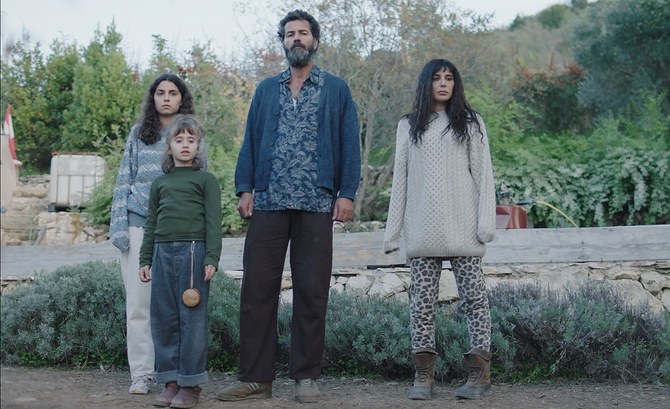
By REBECCA ANNE PROCTOR — arabnews.com — DUBAI: A busy traffic scene in downtown Beirut set to the backdrop of the crumbling silos destroyed in last year’s devastating port explosion tells the tale of a city fighting to get through another day. Life is anything but normal in the bustling Mediterranean city, and from the dockyard debris a crane lifts a foreboding large statue onto a truck as people hurl curses toward it. The statue is transported into the Lebanese mountains to be placed among piles of trash at a new landfill site that surrounds the home of the Badri family. This is the opening scene of Lebanese director Mounia Akl’s first fiction-feature film, “Costa Brava,” which premiered on Sept. 5 at the Venice Film Festival. The film also segues from Akl’s acclaimed 2015 short movie “Submarine” about Lebanon’s 2015 garbage crisis and the corruption behind it.
The opening images, with the sinister Beirut port silos lurking in the background, were not at first intended to be included in her film — a script she began writing four years ago. The 32-year-old filmmaker’s haunting and upsetting feature was originally meant to depict a dystopian Lebanon in 2030 at its worst. “I tried to imagine this dystopian future where none of our problems had been solved and the country was an extreme version of itself,” she told Arab News. “It was somehow a way for me to imagine the worst for myself in the same way you sometimes want to explore your trauma in a cathartic way. It was a way for me to imagine the worst in my mind as a way of avoiding the worst happening in my mind and in life.”
But Lebanon’s crises deepened as Akl and her team got closer to shooting the movie. “The reality of Lebanon became more tragic and more dystopian than even the dystopia that I imagined in 2030,” she said. In the film, the now trash-filled surroundings of Lebanon’s “Costa Brava” had meant to be the free-spirted Badri family’s getaway utopia from the pollution and social unrest of Beirut. But their dreams were trashed when construction of a landfill site started next door to the family’s home.
Walid, played by Palestinian actor Saleh Bakri, tired from a life of activism and protest, decided to move there with his feisty singer wife Souraya, played by Nadine Labaki — the award-winning Lebanese actor, writer, and also director of “Capernaum” — their adolescent daughter Tala (Nadia Charbel), Walid’s determined and spirited mother Zeina (Liliane Chacar Khoury), and nine-year-old Rim, the couple’s youngest daughter. Rim’s charming presence and ignorance of life outside of the Badri family’s once idyllic home is a joyful encounter in this otherwise bleak flick. Costa Brava is an actual landfill in Lebanon that opened in April 2016 as one of two sites advertised by the Lebanese government as a solution to the eight-month trash crisis the country had experienced the year before. However, within two weeks of its opening, residents and activists launched protests at the site demanding its closure. While devoid of a tight plot, the characters in Akl’s debut feature illustrate Lebanon’s present dark reality — economic and political crises described by the World Bank as the worst in modern history.
But not much of a plot is needed, as the psychological trauma and constant threat of doom are all experiences that Akl, and her cast, have experienced. And while the idea of piles of trash encroaching on a family’s residence seems outrageous enough to be pure fiction, it is close to home and a literal reality for many Lebanese. Akl’s “Costa Brava” acts as a metaphor for Lebanon’s current predicament. Her crew produced the movie against all the odds, and she adapted the script for the film to be set a few years after the Aug. 4, 2020, Beirut port explosion, instead of in 2030. Akl and her team were together in their office when the Beirut blast took place. They had planned to start the film shoot in one month. She said: “In a split second our lives completely changed from having creative meaning to looking for each other amidst the rubble; no one spoke about the film for two months. We were all grieving for our city. “When we met again, we decided to move forward to exist because existing is now a form of resistance in Lebanon,” she added.
Other challenges arose. Some of the production money could not be accessed at the bank but Akl’s crew decided to press ahead despite some still suffering from post-traumatic stress disorder and injuries from the explosion. “The film itself became a form of group therapy that we all needed — it was a moment of unity and creativity for us to feel like they haven’t taken everything from us,” she said. Akl pointed out that “Costa Brava” represented “a love letter to Beirut.” She added: “I made a film about a family living in the mountains and it is set in the mountains, but the film is about Beirut.”
As the Badri family encounters more agony, Souraya leaves to go back to Beirut while Walid stays behind. The young Rim wants her family to be together again and decides to go to the Lebanese capital and see the world for herself. She smiles when her father agrees to take her but as they travel to the city Rim grows increasingly confused about what she will discover there. At its close, “Costa Brava” trails off similar to Lebanon’s current fate: An unfinished story of woe tinged ever so slightly with hope.



